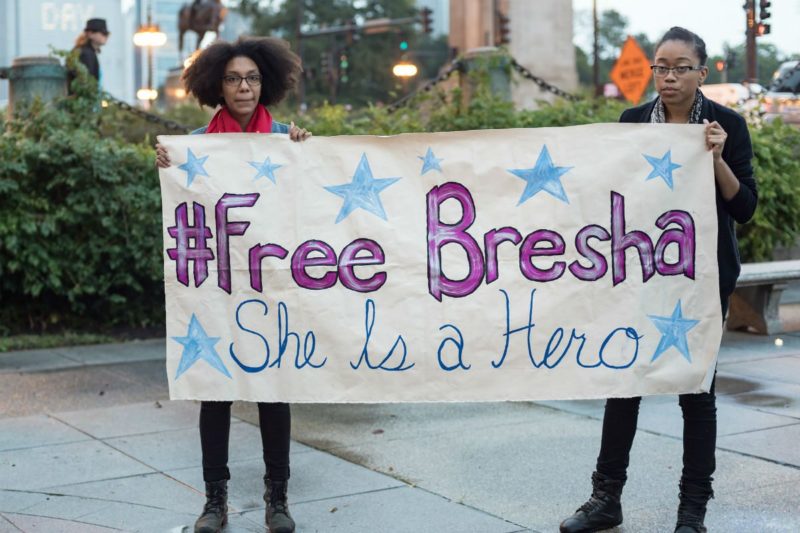Bresha Meadows Will Spend One More Birthday, Thanksgiving, and Christmas Away From Her Family
"She's extremely relieved," Bresha's attorney Ian Friedman told Rewire, noting that when he sat with her after the hearing, "it was the first time she showed optimism."

On Monday, after nine months behind bars, Bresha Meadows appeared in court for her final pre-trial hearing. At 1:30 p.m, she entered a plea of “true,” the juvenile court equivalent of “guilty,” to reduced charges of involuntary manslaughter. She was sentenced to a year and a day in juvenile jail, plus six months in treatment and two years of probation. Her sentence includes the nine months Bresha has already served behind bars, meaning that she will spend 60 more days in detention before being sent to a juvenile treatment facility.
As Rewire previously reported, on July 28, 2016, Bresha, then age 14, was arrested on charges of killing her allegedly abusive father. Before her arrest, the teenager had run away to her aunt’s home twice. Each time, her father, Jonathan Meadows, called the police and accused his in-laws of kidnapping. After she returned home, according to her family members, the violence and abuse continued.
After her arrest, Bresha was sent to the Trumbull County Juvenile Detention Facility in Warren, Ohio, to await her day in court. In December, prosecutors announced that they would charge Bresha as a juvenile rather than an adult. That meant that, if convicted at trial, Bresha could have been held in juvenile detention until she turns 21.
In early May, defense attorney Ian Friedman announced that a possible plea was in the works. Under the terms of the original plea agreement, Bresha would have immediately spent the next nine months in the treatment facility. Her record would be sealed and, upon turning 21, expunged.
Under the terms of today’s plea, Bresha’s record will be sealed after three years and, in five years, expunged or totally erased. “She’s extremely relieved,” Friedman told Rewire, noting that when he sat with her after the hearing, it was the first time he’d seen her genuinely smiling. “It was the first time she showed optimism.”
Friedman himself says he is happy with the result, which is a long way from the initial charge of aggravated murder, the threat of being tried as an adult, and the possibility of life in prison. “Instead, she’ll be able to go home to her family in a matter of months,” he said.
Jonathan Meadows’ siblings were also in court on Monday. They continue to maintain that their brother was not abusive. His sister, Lena Cooper, publicly spoke out against a plea deal for her niece and, at sentencing, read a victim impact statement denying the abuse. However, the day before the hearing, Jonathan’s nephew came forward with stories of the violence and abuse he had suffered at the hands of his uncle 20 years earlier, stories that corroborate those of Bresha’s family.
Ja’Von Meadows-Harris moved in with Jonathan Meadows and his wife, Brandi, as a 6-year-old foster child. Bresha had not yet been born; her siblings were 1 and 2 years old. Ja’Von described years of continuous abuse, including physical harm, constant confinement to his room, and social isolation. He also recounted repeated instances in which Jonathan hit his wife. Once, late at night, he saw Jonathan hit Brandi while she was holding their newborn daughter Bresha.
“I don’t know what she said but it pissed him off and he hit her—he just backhanded her. He hit her so hard that she fell down,” he told the Cleveland Plain Dealer. According to Ja’Von, Jonathan continued to punch Brandi as she curled up on the floor attempting to protect baby Bresha. When 12-year-old Ja’Von tried to intervene, he said, his uncle smacked him, sending him flying across the room. “He walked over to me and he grabbed me by my shirt and he said, ‘You ain’t never supposed to turn against me. I’m your family.'” Shortly after, a social worker removed him from the Meadows home. According to Ja’Von, now 27, he told her what he had endured, but no action was taken against his uncle.
On Monday, Bresha’s family and supporters packed the courtroom. “She could see us,” said Bresha’s aunt, Martina Latessa, in an interview with Rewire shortly after the sentencing, “but we didn’t get to hug her or have any contact.”
“She’ll have to do one more Thanksgiving and one more Christmas away,” Latessa told Rewire. Bresha will also spend her 16th birthday in confinement, but by then, says Latessa, she’ll be in the treatment facility that encourages family visits. There, Bresha will have access to mental health services unavailable at the detention center. She will also be allowed phone calls, her own clothes, and the ability to go outside. “We’ll be able to bring her a cake,” Latessa said.
In court, Friedman stated that the movement to free Bresha has helped keep her spirits up during her lengthy confinement and uncertainties about the future.
“I’ve never seen anything like it,” he told Rewire after the sentencing. The outpouring of support has also helped the family raise the money necessary for legal expenses and the cost of the treatment facility—which they’ll be responsible for, pointed out Mariame Kaba, who is part of the #FreeBresha campaign.
Noting that both Bresha and many family members are relieved at the sentence, Kaba told Rewire, “What’s important is how they’re feeling and how she’s feeling.”
But, she added, “the position of the #FreeBresha campaign is that plea deals are coercive and they’re a violent means of social control.”
The facility also retains the ability to increase the amount of time Bresha must stay if staff decide that she needs to continue treatment. The #FreeBresha campaign, then, will remain active.
Kaba concluded, “We’re committed to supporting Bresha’s freedom, and she’s not free yet.”
